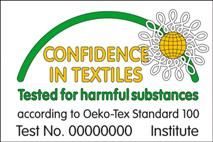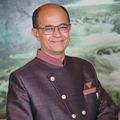Bühler AG products bags Oeko-Tex Standard certificate

They expect the textiles to be tested for harmful substances and certified by an independent authority. That is why nearly all customers in Europa require certification to OEKO-TEX Standard 100 today. We have even seen an increasing popularity of the OEKO-TEX Standard in countries overseas such as the USA. Our American subsidiary has been certified to OEKO-TEX Standard 100 since 2012.
Sustainability in all areas
The concept of sustainability can be seen in all areas and activities of Hermann Bühler AG: ‘It starts with the selection of the fibres used by us and continues with the use of renewable energy sources all the way to short transport routes of the products to our customers in Europe,’ Martin Kägi explains. ‘Beyond this our machinery is constantly being monitored and optimised with regard to yarn quality and productivity. For years we have been employing the revolutionary AirJet spinning method by Rieter which significantly increases the yarn output while reducing energy consumption by up to 30%.’
Hermann Bühler AG are one of the pioneers in the organic cotton business and have been producing yarn from American extra long fibre staple cotton from certified organic farming (kbA) since 1994. The production of the kbA cotton range ‘SwissCotton Organic’ is completely CO2 free as it uses no fossil fuels.
Electricity for this is generated in company-owned, small local hydroelectric power stations which supply around 10 per cent of the total required energy from this regenerative resource. The Rainbow technology developed in-house furthermore allows dyeing without adding salt or sodium carbonate, meaning these substances can be omitted. Martin Kägi is convinced by the many advantages of the technology: ‘Our Rainbow dyeing process noticeably reduces the strain on the environment.
'The significantly higher dye yield also lets us reduce the required amount of dyestuff, making optimised waste water treatment possible as well. What is more, Rainbow items can be dyed using conventional machines, chemicals and dyes with excellent results.’
With the introduction of the Micro Modal Edelweiss and Micro Tencel fibres, Hermann Bühler AG have additionally set standards for environmentally friendly production processes. The Edelweiss technology developed by Lenzing allows chlorine-free, CO2 neutral production from cellulose to fibre. 85 per cent of the energy required for fibre production is generated from the wood waste from cellulose production.
































-Ltd..jpg?tr=w-120,h-60,c-at_max,cm-pad_resize,bg-ffffff)





.jpg?tr=w-120,h-60,c-at_max,cm-pad_resize,bg-ffffff)
.jpg?tr=w-120,h-60,c-at_max,cm-pad_resize,bg-ffffff)






